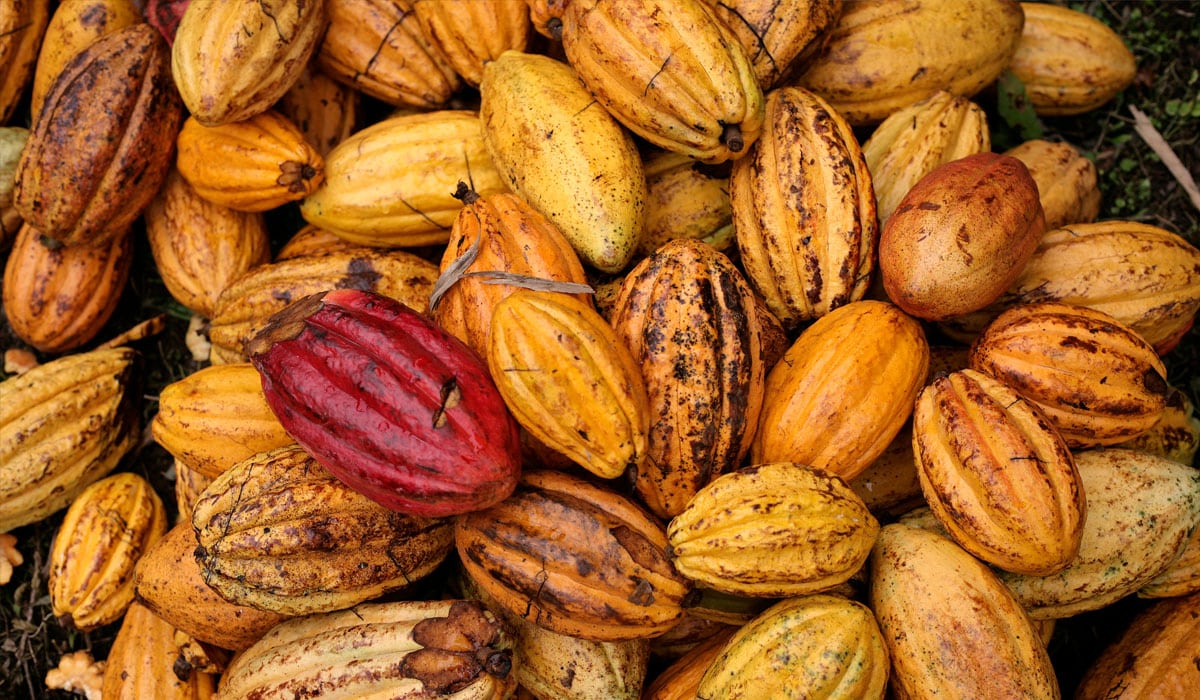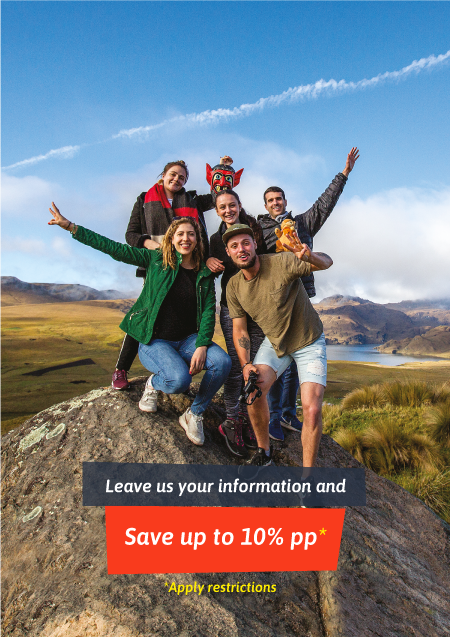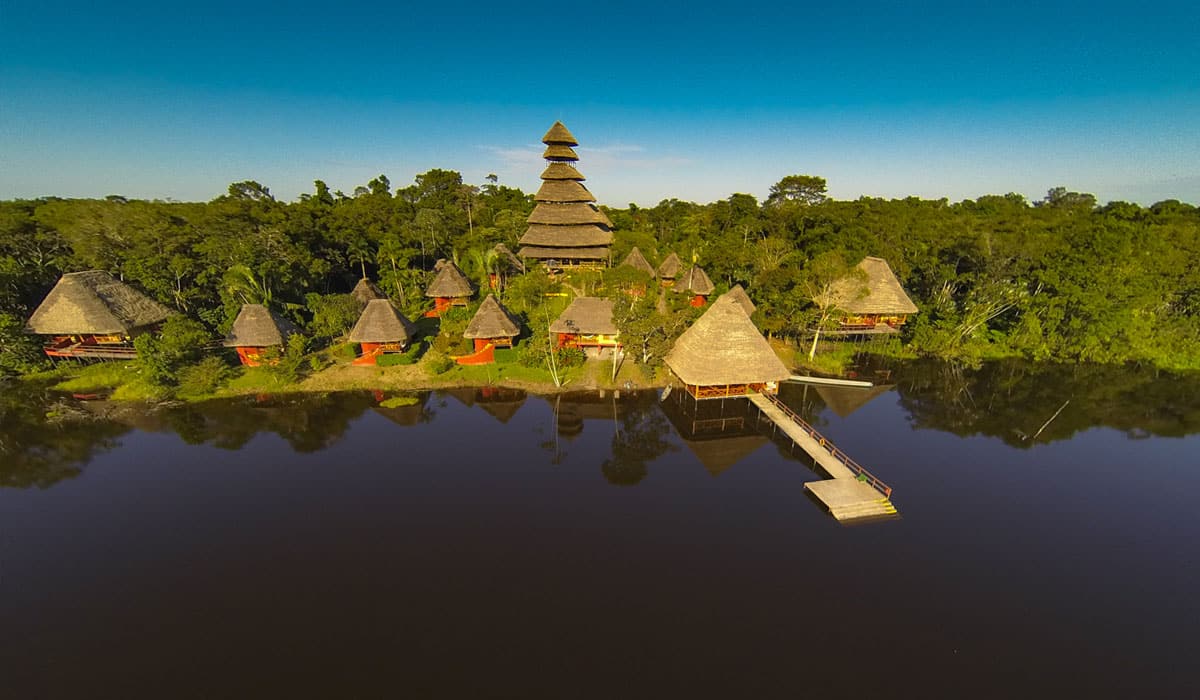Did you know that Ecuador was named the World’s Leading Green Destination by the World Travel Awards for six consecutive years between 2013 and 2018? Ecotourism in Ecuador is a growing industry, and travelers now have numerous options to choose from across the country’s diverse regions.
The idea behind ecotourism is that it functions to promote the wellbeing of local communities while protecting and preserving the environment through sustainable activities. It is an opportunity for the traveler to live and travel more consciously and experience the destination in a more profound and meaningful way.
Must-see Ecological Paradises: Our Staff Recommendations
If you want to explore ecotourism as part of your trip to Ecuador, you can take part in experiences or stay at any of several eco-lodges around the country. Before we get into some unique activities and experiences in the next section, here is a brief list of some lodges we recommend visiting, divided by region. As always, we recommend reading about them and exploring what they have to offer.
[We recommend you check out this blog to learn about community-based tourism in Ecuador.]
Sierra Region
The Secret Garden — Nestled in the hills adjacent to Cotopaxi volcano, the Secret Garden is a mesmerizing and genuinely impressive eco-tourism initiative. Activities here include day hikes, horseback riding, and even summiting Cotopaxi itself!
Black Sheep Inn — Situated in the village of Chugchilán near the breathtaking Quilotoa crater, this ecolodge advocates a holistic approach to conservation by protecting the land, culture, environment, and community. They’re accomplishing this through self-sufficiency, thanks to composting toilets, alternative energy, permaculture-style gardening, and biodegradable, compostable, and recyclable products where applicable.
Llullu Llama — The hike through the surrounding valleys near Quilotoa may take you through the tiny and charming town of Isinliví. Here, the cozy Llullu Llama welcomes visitors from all over the world. Their operation is quite similar to that of the Black Sheep Inn, in their implementation of composting toilets, alternative energy, permaculture-style gardening, and more.
Amazon Region
Tamandua Ecolodge — This ecolodge, comprised of a series of rustic natural cabins, sits inside a beautiful reserve. Its simplicity allows it to blend into the setting, providing travelers with the perfect distraction-free opportunity to connect with and appreciate the region’s flora and fauna. Keep in mind that the walk to the cabins is about 20 minutes from the road, making it a remote destination like few others. The people who manage this spot are also hosts of a remarkable animal rescue and rehabilitation program.
Kapawi Ecolodge — Deep in the Amazon Rainforest near the border with Peru, the Kapawi people have established one of Ecuador’s most interesting ecolodges. Guests arrive by traveling along the river, Río Pastaza, which straddles the provinces of Pastaza and Morona-Santiago. This experience is at once educational and culturally immersive. The lodge is entirely owned and operated by this small indigenous community.
Huasquila Amazon Eco Lodge — In Cotundo, a small community just north of Tena, this inviting spot offers travelers the opportunity to relax and explore the Amazon Rainforest without having to leave their low-impact, environmentally-sound retreat within the Sumaco Biosphere Reserve. It is located about 3 hours by car from the capital city of Quito.
Finca Heimatlos — At the edge of the Amazon Rainforest, in Pastaza Province, sits a fascinating ecolodge and sustainable farming project on 50 hectares of pristine land. Finca Heimatlos is a perfect spot from which to explore exciting trails and glimpse exciting wildlife. The farm component makes an effort to blend permaculture with regional, low environmental-impact farming practices
Coastal Region
Azuluna Ecolodge — The area known as Las Tunas in the Province of Manabí is host to some of the most stunning ocean views and beaches in Ecuador. Azuluna Ecolodge receives visitors from all over and is situated very close to the Machalilla National Park. Apart from its work to conserve and protect the environment, Azuluna also supports several fair-trade and community development projects in Las Tunas and nearby Ayampe.
Umbrellabird Lodge — In the Buenaventura Reserve, just a short drive inland from the southern coast of Ecuador, the Umbrellabird Lodge provides a riveting experience for birders and conservation enthusiasts from all over the world. This spot is run by the Jocotoco Foundation, which employs some of the most thorough ecological practices around. They partner with the community to preserve this biologically diverse gem in a part of the country that the typical tourist does not often frequent.
Cabalonga EcoAdventure – In Puerto Cayo, home of some of Ecuador’s most beautiful beaches, Cabalonga EcoAdventure is dedicated to safeguarding the region’s incredible biodiversity. Guests of Cabalonga take part in memorable and awe-inspiring outdoor experiences that enlighten and help support local economies, like those of the artisan community and conservationists.
What to Consider Before Experiencing Ecotourism in Ecuador
Have you heard of the term “greenwashing”? It is used to describe hotels and businesses that appear eco-friendly, but are not. You’ll find that ecotourism in Ecuador may have very different applications and interpretations, depending on local standards.
If you wish to choose ecologically-sound establishments during your travels, make sure you thoroughly investigate the hotel or business before making a reservation. Visit their website, read TripAdvisor reviews and email them directly. Specifically, ask how the establishment supports the community and promotes low-impact tourism.
This is particularly important for your visit to more remote and pristine areas of Ecuador, like the Amazon Rainforest and Galápagos Islands.
Ecotourism Options Along the Pacific Coast of Ecuador
Compared to the Amazon, ecotourism establishments along Ecuador’s Pacific Coast are sparse, but here are a couple of spots worth visiting.
Río Muchacho Organic Farm and Ecolodge — Located near the seaside city of Canoa, this 10-hectare organic farm and ecolodge is an inspirational and relaxing place to visit. Apart from being completely self-sufficient, Río Muchacho offers courses on sustainable agriculture and permaculture to visitors and the local community.
Finca Sarita — This organic farm near the coastal town of Calceta also happens to produce some of the world’s most expensive chocolate. Owned by a local family that champions permaculture and organic farming techniques in the community, Finca Sarita is entirely self-sufficient and offers travelers accommodations and meals for just $15. The town of Calceta is known for its production of traditional pottery.

El Pital — This small community located within the rainforest area of Machalilla National Park can be visited by traveling along the La Bola de Oro trail, the base of which you’ll find in Puerto López. This region’s rich vegetation and wildlife make the experience a unique and exciting alternative for any ecotouristic trip through Ecuador. One can hike the trail or travel on horseback. Naturalist guides from the Machalilla National Park provide much information and point out all sorts of birds, flowers, and insects along the way.
Ecotourism Alternatives in Ecuador’s Amazon Jungle
Ecotourism in Ecuador’s Amazon is often merged with community-based tourism initiatives. Some of these are standalone operations, while others partner with high-end lodges. Here are a few we like to promote:
Sinchi Warmi – If you want to support a project owned and led by indigenous Kichwa women, come to Sinchi Warmi (which means “strong women” in the Kichwa language). This community tourism project is based near Misahualli (only 3-4 hours from Quito). It provides accommodations in attractive rustic cabins built around a small lake and features local dishes in their restaurant (they also have vegetarian options).
Campamento Kwakwiyo – Run by the Siekoya Remolino community near Lago Agrio, this camp sits on 17,000 hectares of protected rainforest close to the Colombian border. Visitors can stay with families or in a covered camping area. A unique activity here includes the ayahuasca ceremony, led by local and well-respected shamans. Other activities include day hikes, night walks, bird and wildlife watching, and canoe trips.
Fundación Hola Vida – Near the Amazonian city of Puyo (4-5 hours from Quito), this community-led ecotourism initiative gives you access to 225 hectares of secondary rainforest where you can visit Hola Vida, a large waterfall. You can either hire a local guide to explore the area or go independently along clearly designated trails.
The “Leave No Trace” Principle
“Leave No Trace” is a widely known set of outdoor ethics principles developed in the United States that you can, and should, apply in Ecuador (and pretty much anywhere else you travel!). Leave No Trace was developed to promote environmental conservation by minimizing human impact. It consists of 7 principles, including:
- Plan ahead and prepare
- Travel and camp on firm ground
- Dispose of waste properly
- Leave what you find
- Minimize campfire impacts
- Respect wildlife
- Be considerate of other visitors.
The idea is, after enjoying your time in the outdoors, you leave it as you found it (if not better!), and it’s always a good and considerate thing to do—to collect any trash you find along the way.



